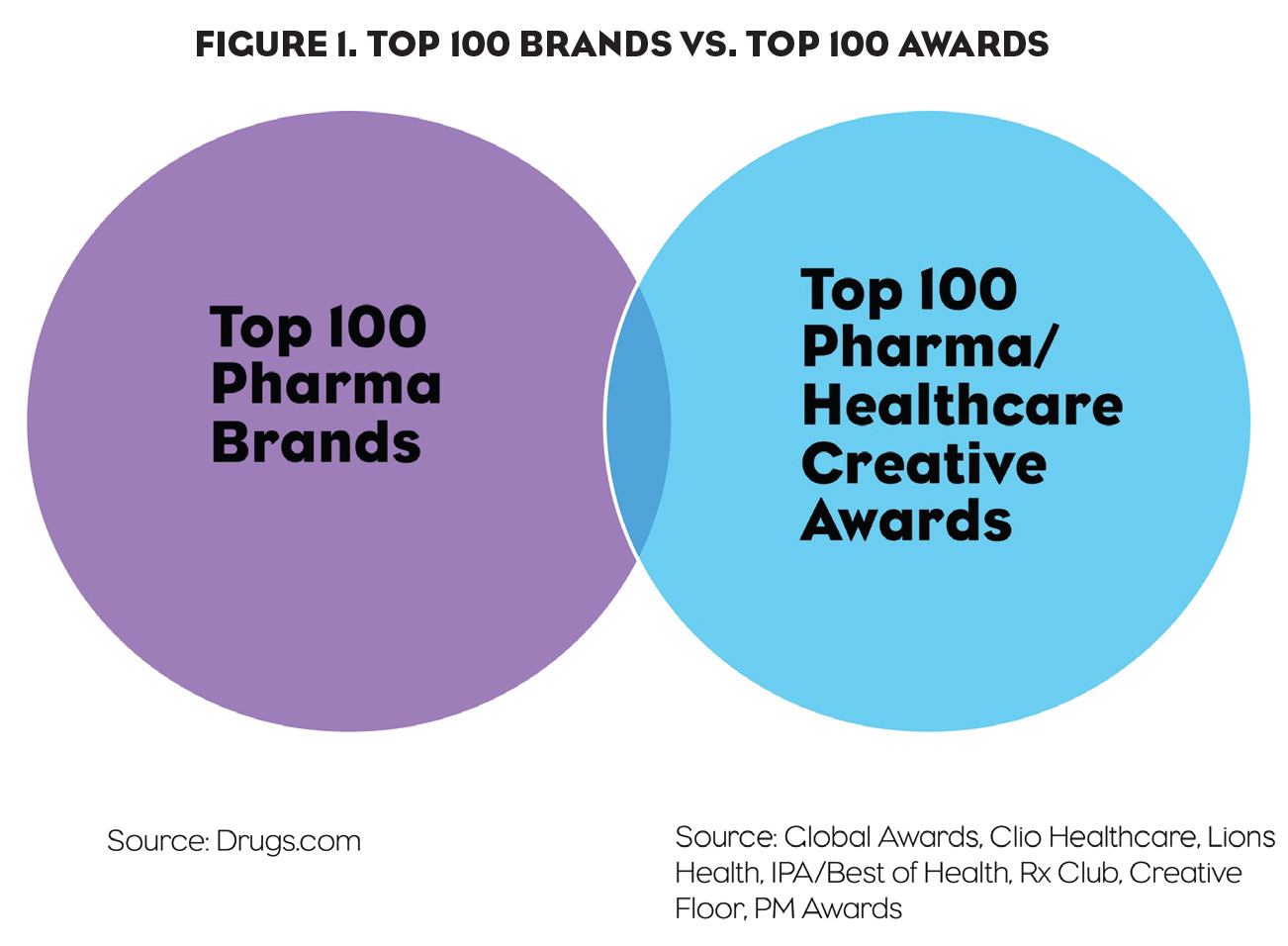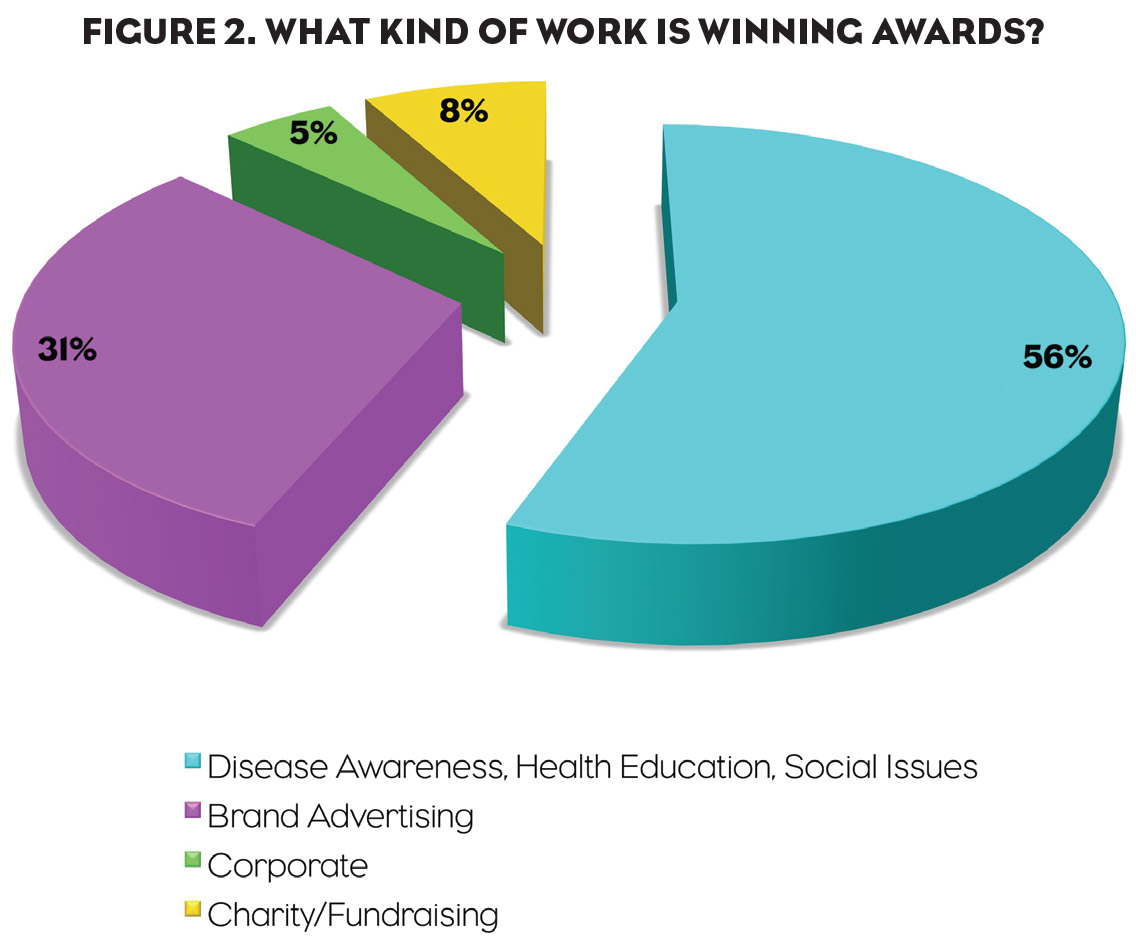It’s the Elephant in the Boardroom.
There are more creative award shows than ever before. Creative standards in pharma advertising have, by general consent, never been higher. But the awards are not going to the brands that attract the big advertising budgets.
If you think this is an unfounded assertion, take a look at the world’s top 100 pharma brands and compare those to the top 100 winners in the past year’s pharmaceutical/healthcare creative award shows (Figure 1).
 Can you guess how many brands occupy both categories? Two. Only 2% of the top creative awards went to the world’s leading brands.
Can you guess how many brands occupy both categories? Two. Only 2% of the top creative awards went to the world’s leading brands.
The lack of correlation between commercial and creative success is striking. Isn’t advertising supposed to create and sustain successful brands? Shouldn’t the biggest brands have the benefit of the most creative campaigns?
To discover the reasons behind this paradox, we asked some senior people in pharma companies and ad agencies for their opinions. To encourage candor, we assured them anonymity and provided some of their responses below.
Big Brands Don’t Need Creativity To Succeed
“My brand is not built on advertising but on clinical evidence and sales effort.” – Marketing Manager
There is ample evidence from consumer advertising that creatively awarded brands achieve better sales performance than brands which don’t win awards.1,2 An analysis of ads from the past 30 years showed that the most effective campaigns had little or no rational content but were based on powerful, emotion-based brand reminders.3 Somehow these lessons have not filtered through to pharma.
In our world, people seem unconvinced about the link between creativity and effectiveness. They point out that many big brands do very well despite uninspired campaigns. That may be true. But what could we achieve if we married the best clinical performance with the best creative ideas?
Global Branding Is The Enemy Of Creativity
“Global branding produces vanilla concepts to suit all markets, reduced to the lowest common denominator to cause the least offense.” – Agency CEO
The view that global branding crushes creativity is shared by marketers and agencies alike. Global branding started out by focusing on brand identity to ensure that the look and feel of the brand was the same in all markets. But the principle has spread to brand campaigns.
The goal of global branding is consistency and uniformity, while the aim of creativity is to be different and stand out. The best of both worlds, surely, is to combine globalized branding with localized campaigns. But how often is this implemented?
Creativity Works Best For Challenger Brands, Not Leaders
“A good campaign can build the profile of a new brand, but once it is established the job is done.” – Sales & Marketing Director
Great campaigns have given many new brands a leg-up to fame and fortune. Creativity is also required to sustain successful brands, which need to be nurtured so they stay fresh in people’s minds.
It can be liberating to be the underdog rather than the top dog. As Steve Jobs said, “I’d rather be a pirate than join the navy.” But when Apple became the world’s most successful company, did they stop advertising? No, they spent even more.
Many agencies believe that smaller companies and smaller brands give them more creative freedom. They find it easier to conceive great ideas without the constraints of a big client or the expectations of a large brand. In fact, some agencies target smaller, non-mainstream companies with the express intention of garnering awards.
Pharma Is Different From Consumer Advertising
“What works for soap powder doesn’t work for a monoclonal antibody. Doctors make decisions based on facts, not gimmicks.” – International Brand Manager
A widespread belief is that the rules which govern other business sectors do not apply to pharma. The reasoning: We are a rational, science-based industry and our customers make decisions based on objective appraisal of risks and benefits.
This notion is not borne out by facts. Healthcare decision makers, like the rest of us, are subject to the normal laws and flaws of human behavior. Their decisions are influenced by non-rational factors such as heuristics (mental short-cuts) and biases, which advertisers can leverage if they are given the opportunity.
Big Pharma Decision Making Discourages Creativity
“People are frightened of making a claim that attracts a complaint or a decision that their managers frown upon. Hence you get decision by committee and literal interpretation of research.” – Agency Planning Director
Creativity means taking risks, and Big Pharma is risk averse. Marketers are motivated by the need to deliver results and demonstrate ROI. Creativity is difficult to define and quantify, and marketers are nervous about anything they can’t see, touch and measure.
Market research doesn’t help because it applies in vitro methodology to in vivo behavior. Concept testing may highlight communication problems but it won’t identify the most creative idea.
Agencies Are Migrating Away From Traditional Brand Advertising
“We’re looking at how to do better [in award shows] with big experiential thinking.” – Executive Creative Director, Global Network
The communication landscape is changing. Consumer agencies have followed the movement of customers from mass media into digital channels and social media. They frame their messages in ways that will attract the most shares, likes, and impressions, in the hope that this will translate into sales.
Pharma has been slower to migrate to the digital space. But a disproportionate number of creative awards are going to non-traditional media such as short-form video, ambient, experiential, native, and social channels.
Although the direction of travel is away from brand advertising and towards digital interaction, robust evidence suggests that brand promotion using traditional media delivers better results.3,4
Awards Are Going To Causes, Not Campaigns
“We have to fish where the fish are. Most awards today are won by issue-driven entries, not brand campaigns.” – Executive Creative Director
Agencies have always done pro bono work, partly to exercise their creative chops and partly because they want to do some good as well as shift goods.
As Figure 2 shows, the majority of awards are going to entries that fall under the categories of disease awareness, health education or social issues. So have ad agencies grown a conscience? Or is altruism the new self-interest?
Whatever the motivation, it raises the question: How can agencies run a business if they are doing their best work for next to nothing?
An agency spokesperson explained: “Our agency has two types of accounts. With type A accounts, the clients trust us and give us creative freedom, so we give them TLC. With type B accounts we have to do exactly what the client says, so we deliver the work and send them the invoice. Type A accounts win awards, type B accounts pay the bills.”
Creative Awards Are Irrelevant To Real-World Marketing
“I think there are two types of creativity—the type that generates sales and the type that wins awards. I prefer the first.” – Marketing Manager
Many pharma companies maintain an arms-length relationship with agencies. Some deter their employees from attending award ceremonies. This makes them less inclined to regard their agencies as partners and devalues their view of awards. As one global brand manager told us, “Ad agencies live in a make believe world. I work in the real world. In fact I sometimes wonder if we occupy the same planet.”
Some agencies have made the decision to sidestep awards judged by customers in favor of those judged by their creative peers. This reinforces the perception that agencies are more interested in self-promotion than supporting brands.
Does It Matter?
A brand manager told us, “I don’t care what my agency gets up to in Cannes or New York, as long as they deliver my detail aid on time.”
But the gulf between brand advertising and creative awards is symptomatic of a growing distance between agencies and their clients. And a weaker relationship between pharma companies and agencies means that accounts come up for pitch more frequently, fewer agencies are on long-term contracts or retainers, and there is a lack of brand continuity.
Both parties are losing out from this lack of collaboration. Big brands are not utilizing the power of emotional engagement. Agencies are not putting their creative skills at the service of their bill-paying clients.
How Do We Fix The Problem?
The mindset of agencies and their pharma clients will never be identical. Creatives are from Venus, marketers are from Mars. But what can we do to make the planets align?
For a start, pharma marketers could learn from other business sectors about how to get maximum value from advertising and how to get the best from agencies. They need to revise their attitude to risk, from avoiding failure to pursuing success. They should treat agencies as business partners, which means learning to trust them and surrendering some control.
Agencies need to earn that trust by demonstrating a better understanding of client strategy and a willingness to contribute to it. We need to provide evidence of the benefits of creativity in terms that clients will accept. We have to broaden our focus onto long-term brand growth, not the short-term cycle of creative campaigns. Above all, we need to dispel the impression that we are glory hunters preoccupied with the pursuit of awards.
Bridging the trust gap is vital to restore a healthy relationship. Who’s ready for the challenge?
References:
1. “Creativity Matters – The Business Case for Creativity,” Cannes Lions, 2016. http://bit.ly/1VgF3Mg.
2. “The Link Between Creativity and Effectiveness,” IPA, 2010 (updated 2011). http://bit.ly/1RFYnUk.
3. “How the Mad Men Lost the Plot,” Ian Leslie, Financial Times,
Nov 6 2015. http://on.ft.com/1HfV2YC.
4. “How Brands Grow,” Professor Byron Sharp, Oxford University Press, 2010. http://bit.ly/20P2WS2.




